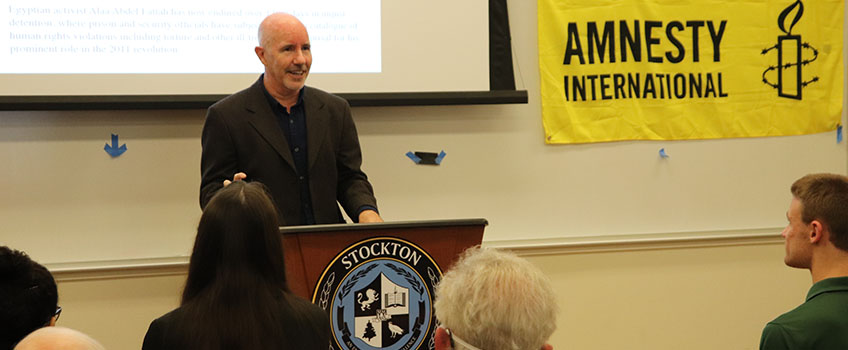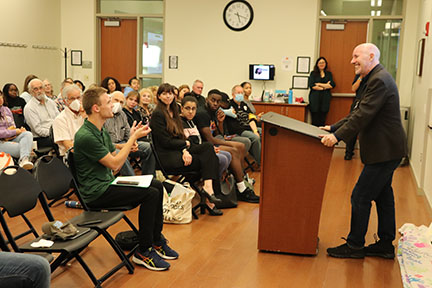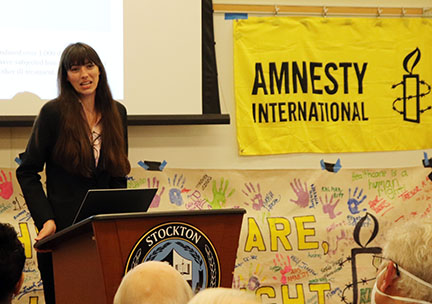Head of Amnesty International USA Encourages Students

Amnesty International USA Executive Director Paul O'Brien addresses a crowd of about 50 students and community members about the nonprofit's mission on Oct. 6.
Galloway, N.J. — As the head of Amnesty International USA, Paul O’Brien knows how important students are to his organization.
“We are a member-led movement, and our membership always starts with students,” said the new executive director of the nonprofit during an appearance at Stockton University on Oct. 6.
“I have two board members who were leaders of student groups two years ago and they are my bosses — both under 25,” he said. “We as a movement know that our power lies in whether we can be relevant to student groups across the country.”

O’Brien’s talk on campus was presented by the Global Studies minor and local chapters of Amnesty International USA at Stockton and in Ocean City. At least 50 students and community members gathered in the Campus Center to hear O’Brien speak about the human rights group’s future initiatives and ask him questions.
The talk focused on several things, including how Amnesty needs to continue to evolve to meet the changing needs of its supporters, many of whom have a lot of different options to express their activism.
“We have to evolve in a way that makes folks feel like we are respecting that they have other choices,” he said. “Create that sense of community that’s listening to each other and really wants to harness our collective power by treating everybody as a leader in their own right.”
He also emphasized Amnesty needs to create a space for student groups and local groups to try new things.
“We have to be OK as a community to try new things and fail. We’ve got to learn how to fail faster, accept that that’s an OK part of what we do and try something else,” he said. “And when something is working, we have to be able to invest in it more — find the front-line leaders who are making a difference and find a way to get them the help they need.”
O’Brien said Amnesty USA has about 600 local and student groups and one of his primary jobs is figuring out the best ways to get that number to grow.
“We want to expand each group so that more students want to sign up and be a part of what’s going on. And to listen to what they think is effective activism,” he said. “We need ideas and energy because bad guys are changing their tools, and we need to change ours.”
 That focus on individual members is one of the reasons why Emily Kramer became the
president of Stockton’s Amnesty group in 2021. She said she had no idea what Amnesty
International was until taking a class with Lauren Balasco, an assistant professor
of Political Science. Balasco is also the faculty advisor for Stockton’s Amnesty group.
That focus on individual members is one of the reasons why Emily Kramer became the
president of Stockton’s Amnesty group in 2021. She said she had no idea what Amnesty
International was until taking a class with Lauren Balasco, an assistant professor
of Political Science. Balasco is also the faculty advisor for Stockton’s Amnesty group.
“The talk really helped my group feel more invested in the work that we do,” said the senior Political Science major from Marlton. “The way that Amnesty works is so much different from every other nonprofit that I’ve worked with. It really is member driven. If you are an individual, you are important, and you can make a change individually if you get enough people behind you. And I think that’s so uniquely amazing.”
The talk really helped my group feel more invested in the work that we do. ... If you are an individual, you are important, and you can make a change individually if you get enough people behind you. And I think that’s so uniquely amazing.”Emily Kramer, president of Stockton University's Amnesty International chapter
“He encouraged us to challenge stuff no matter how we think,” said the immigrant from Egypt who now calls Phillipsburg home. “I feel like nowadays we just tend to walk around the main issues. We don’t want to hurt anyone’s feelings. He challenged that. If you see something that’s wrong, speak up about it because you do have a voice and you can do something.”
That’s exactly the reaction that Balasco hoped students would have after listening to O’Brien.
“When I teach my politics courses, sometimes I do hear the frustration from students on what can I do, is voting enough,” said the coordinator of the Global Studies minor. “I hope with events like this, students that work with each other can see what kind of solidarity emerges with their shared commitments toward human rights and improving the lives of others.”
— Story and photos by Mark Melhorn


